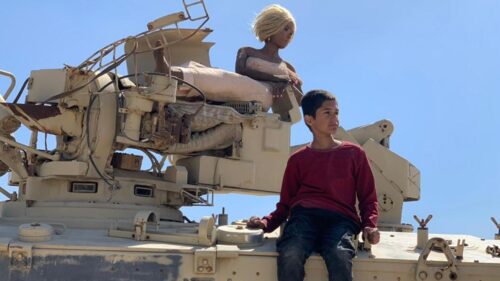
Iraqi director and writer, a student of Berlinale Talents in 2018 and of the London Film School, where he earned a Master’s degree with the award-winning short Children of God (2013), Ahmed Yassin Al Daradji (Baghdad, 1986) presents his debut feature Hanging Gardens, awarded in 2021 in the Final Cut In Venice section.
In your film, the spotlight is on the effects that a conservative society can have on the male perspective, both in adolescence and adulthood. A take that is seldom shown. What is the reason behind this choice?
It is very accurate. The film is provocative even for me personally, but it is an urgent necessity. By the way, the leading makers of this film are women, and the most important of them is the top producer Huda Al-Kadhumi, who runs the Ishtar Iraq film production with a female team. I think that the practised exclusion of women in Iraq is a collective suicide for the future of Iraqi society. Isn’t it strange that a country as old as Iraq does not have a woman who has been appointed as the leader in its history? Isn’t it strange all the violence we’re living through? Therefore, it attempts to show the masculinity anomalies that it suffers from the knots it has made for itself.
Aside from Taha’s neighbour, the only female ‘character’ is a sex doll, Salwah. Can you comment on this aspect?
I am the brother of seven females from a conservative family. One of my sisters got married early, the other left school for marriage, and another married according to my father’s will. The others also went through and are still going through challenging experiences because of the mannish authority inflicted by social norms. I can’t be a silent witness; therefore, in my film, I tried to gain them a victory and perhaps show my solidarity by having the film have absolute male characters. That’s why they are male only, and I can assure you that Hanging Gardens is a film about the imbalance of societies in the absence of women.

As’ad is a twelve-year-old who picks up rubbish in the smouldering dumps of Baghdad. One day, he ends up challenging the values of his fundamentalist and patriarchal community because of his feelings towards a sex doll. Despite his peers’ mishandling of the doll, As’ad h...

As’ad is a twelve-year-old who picks up rubbish in the smouldering dumps of Baghdad. One day, he ends up challenging the values of his fundamentalist and patriarchal community because of his feelings towards a sex doll. Despi...
In your filmography, among other projects there is Ahlaam (2005), which was made after the American invasion of Iraq in 2004. Is it a coincidence that in Hanging Gardens’ Baghdad the West only appears in the form of soul-corrupting racy magazines, military presence, and garbage?
It was never a coincidence that Hanging Gardens is full of metaphors and allusions, and the film is also about post-war societies. Imagine that Iraq was a country like a giant prison and that the Iraqis were trapped between Saddam Hussein’s dictatorship and the devastating economic blockade imposed by the United Nations on Saddam’s regime. The problem is that the US occupation tried to impose its vision by force, and they tried violently to erase a human memory whose age extends into the depth of history and to set a capitalist image of Iraq. The use of sex magazines has several layers of meaning, a reference to the presence of capitalism in conservative societies and the clash of civilizations in Iraq. These magazines are also directed at the Iraqi audience, which is still going through a transitional phase now. These three terms are essential indications of what happened in Iraq, and I tried to make an authentic Iraqi film and avoid the pitfalls of Orientalism. I was arrested by a militia who worked for the American army and ended up spending ten days in the American military, where I was tortured. The use of sex magazines has dimensions of meaning, a reference to the capitalism of conservative societies and the clash of civilizations in Iraq. The appearance of magazines in the film is also directed at the Iraqi audience, which is still going through a transitional phase. These three terms are essential indicators of what happened in Iraq, I tried to make an authentic Iraqi film and avoid the pitfalls of Orientalism.
No results found.